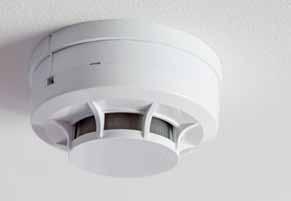
2 minute read
September is Fire Prevention Month

Smoke alarms save lives, but only if you install and use them! No matter your living situation, they help protect you—and your neighbors. You can also put basic safety prevention measures in place while cooking, augmenting heat with portable devices, and dealing with older outlets and sockets. Always have a fire safety plan.
Practice safety with the whole family
■ Find two ways to get out of each room in the event that the primary exit is blocked by fire or smoke.
■ A secondary route might be a window onto a neighboring roof or a collapsible ladder for escape from upper-story windows.
■ Make sure all windows can open, screens can be quickly removed, and any security bars can be properly opened.
■ Practice “feeling your way out of the house” in the dark or with your eyes closed.
■ Teach children to seek help from, and cooperate with, firefighters in case of an emergency.
■ Store matches and lighters out of children's reach and sight, preferably in a locked cabinet.
Cook with safety
■ Stay in the kitchen when you are frying, grilling, or broiling food. If you leave the kitchen for even a short period, turn off the stove.
■ Keep children away from cooking areas by enforcing a "kid-free zone" of 3 feet around the stove.
■ Never leave children unattended near operating stoves, even for a short time.
If you must use a portable heater
■ Buy only heaters evaluated by a nationally recognized institution, such as Underwriters Laboratories (UL).
■ Make sure the heater has a thermostat control and switches off automatically if the heater falls over.
■ Keep combustible items, children, and pets at least 3 feet away from the heater.
Prevent electrical fires
■ Frayed wires can cause fires. Replace worn, old, or damaged appliance cords immediately.
■ Never run electrical cords under rugs or furniture.
■ Never force-fit a three-prong electrical plug into a two-slot outlet or extension cord.
■ If a light switch is hot to the touch or the room lights flicker, immediately shut off the switch and have a licensed electrician check your wiring and replace the switch.
If you want to install alarms yourself
■ Install smoke alarms on every level of your home, including the basement.
■ Test batteries monthly. Replace batteries each year (unless it’s a 10-year lithium battery model).
■ Never disable a smoke alarm while cooking—it can be a deadly mistake.
■ Replace the entire smoke alarm unit every 8–10 years or according to the manufacturer’s instructions.
How to get free, city-installed smoke alarms If you own and live in a one- or two-bedroom Queen Village home, you can request free smoke alarms, and the Fire Department will install them. This includes smoke alarms designed for hearing-impaired or deaf residents. You should have one alarm on each floor of your home, including the basement. To request smoke alarms, call 3-1-1 or request them online at http://bit. ly/free-smoke-detector. If you need them, please order your smoke alarms today—it sometimes takes as long as 60 days from your order until the actual installation.
If you rent, your landlord is responsible for smoke alarms If you live in an apartment building or are renting a house, the landlord must provide smoke alarms on every level of the home. If your landlord has not provided smoke alarms, call Philly 311 to report the violation. ■






